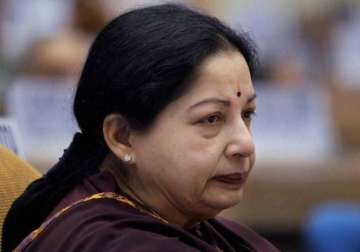Bengaluru: A special bench of the Karnataka High Court will hear, from Jan 5, the corruption case against former Tamil Nadu chief minister J. Jayalalithaa and her three aides on a daily basis.
Though the case came up for hearing Friday before Justice H. Billappa, Jayalalithaa's counsel sought its postponement to Monday, as Justice C.R. Kumaraswamy, who has been appointed to hear it, is on leave till Saturday.
Chief Justice D.H. Waghela Thursday set up the single judge bench, as directed by the Supreme Court Dec 18 to hear the appeals of Jayalalithaa and her three associates to expeditiously decide their plea within three months.
The other three are V.K. Sasikala, V.N. Sudhakaran and J. Ilavarasi.
The apex court had also Dec 18 extended the three month bail period of Jayalalithaa by another four months in the Rs.66.65 crore disproportionate assets case, in which a Central Bureau of Investigation special court Sept 27 sentenced her to four years simple imprisonment along with Rs.100 crore fine.
The three co-accused were also sentenced to four years simple imprisonment but with a fine of Rs.10 crore each.
Complying with the apex court's Oct 17 order, Jayalalithaa's counsel submitted to the high court Dec 8 all the relevant documents, running into a whopping 215,000 pages in 686 volumes.
The apex court had also Oct 17 granted bail to Jayalalithaa and the others on their appeal against the high court's Oct 7 verdict, which refused to release them on bail from the Bengaluru central jail during the pendency of their appeals.
The criminal appeals seek to quash the special court's orders, which convicted and sentenced all the four accused, not to collect the penalty amount, return the confiscated property and grant them bail till the case was disposed of by the higher courts.
